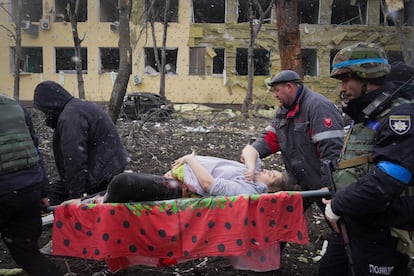‘20 days in Mariupol’: Pushing the boundaries or crossing a line?
Call me old-fashioned, but I still believe in a person’s right to decide if they want to be a symbol of the horrors of war or to grieve in private

It is hoped that the Oscar for Best Documentary will bring a lot of audiences to 20 Days in Mariupol, although I don’t think the majority will make it to the end.
Contrary to what our morbid curiosity might tempt us to see, the bloody gruesomeness of the film is very off-putting, and there are not many people with the stomach needed to digest the close-ups of dead children, vans full of bodies, and pregnant women with their intestines hanging out. It took me two attempts to watch it, but not because of the gore — unfortunately, my stomach can take horrific scenes — but because of how director Mstyslav Chernov has made the film. He has resorted to the tricks that I most detest in tabloid journalism. Rather than pushing the boundaries, this film crosses a line.
20 Days in Mariupol has original music, composed by Jordan Dykstra, and Chernov’s narration is funereal and effective. These are two basic devices used to manipulate the audience, and they turn the testimony into a cheap melodrama. But I have deeper reservations. Many of the protagonists are filmed against their will, and some do not even know that they are being recorded.
At first you even hear protests: “Don’t record us,” say some residents fleeing their homes. Chernov harasses and persecutes the subjects of his documentary like a paparazzo, and since it is inevitable for me to put myself in the place of all those people, I know that I would not be happy if the whole world saw me cradling my dead baby or the dismembered corpse of my son in order to provide the evening’s entertainment for some European family living in peace and comfort. Call me old-fashioned, but I still believe in a person’s right to decide if they want to be a symbol of the horrors of war or to grieve in private.
On the fiction side, The Zone of Interest won the Oscar for Best Sound with no music and hidden narrators, which give the audience the feeling that the film tells itself. On the other hand, 20 days in Mariupol is written to the greater glory of its creators. The plot is the heroism of the journalists, how they send their images, and how they get them out of the besieged city, in an exercise of professional narcissism that is difficult to justify.
In a curious reversal of roles, The Zone of Interest is fiction, but it is close to the truth and encourages us to reflect deeply on morality. Conversely, 20 days in Mariupol is a documentary that turns truth into cheap fiction. I suppose Chernov will dismiss my misgivings as the squeamishness of a privileged writer who has not been stained with blood. Maybe. But the saying that anything goes in love and war is not meant to be taken literally. You can report on hell without making a pact with the devil.
Sign up for our weekly newsletter to get more English-language news coverage from EL PAÍS USA Edition
Tu suscripción se está usando en otro dispositivo
¿Quieres añadir otro usuario a tu suscripción?
Si continúas leyendo en este dispositivo, no se podrá leer en el otro.
FlechaTu suscripción se está usando en otro dispositivo y solo puedes acceder a EL PAÍS desde un dispositivo a la vez.
Si quieres compartir tu cuenta, cambia tu suscripción a la modalidad Premium, así podrás añadir otro usuario. Cada uno accederá con su propia cuenta de email, lo que os permitirá personalizar vuestra experiencia en EL PAÍS.
¿Tienes una suscripción de empresa? Accede aquí para contratar más cuentas.
En el caso de no saber quién está usando tu cuenta, te recomendamos cambiar tu contraseña aquí.
Si decides continuar compartiendo tu cuenta, este mensaje se mostrará en tu dispositivo y en el de la otra persona que está usando tu cuenta de forma indefinida, afectando a tu experiencia de lectura. Puedes consultar aquí los términos y condiciones de la suscripción digital.









































